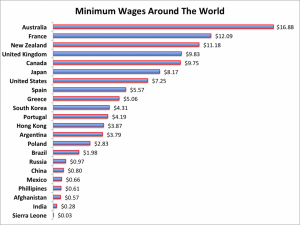The think tanks are spinning their lines now that Congress is considering raising the federal minimum wage. A Democratic proposal would hike the level from $7.25 an hour to $10.10 by 2016, putting more money in the pockets of 27.8 million people.
As The New York Times points out this morning, think tanks and other professional navel gazers are coming out with the pros and cons of doing what seems to be a no brainer. One Employment Policies Institute in Washington claims that hiking the wage would increase poverty and unemployment.
Not reported, the Times notes, is that the think tank is run by a P.R. group paid in part by the restaurant industry which has a vested interest in keeping wages low.
So, I guess it is no surprise that on Sunday’s “Commentary” front page in the Richmond Times-Dispatch is a piece making pretty much the same argument. It was written by A. Fletcher Mangum, managing partner of Mangum Economics in Richmond, who also advises the governor and General Assembly.
Mangum argues that raising the wage is a bad idea because, “If politicians want to help the least fortunate among us, knocking an unlucky number of them into employment is simply not the best way to do it.” Virginia is one of 19 states that follows the federal minimum wage as its own. Twenty states have higher minimum wages and four have lower rates and (of course) are all in the South.
Mangum’s logic is keep ’em poor because they are more hireable that way. Mangum offers no other economic argument, but that should be no surprise since he’s writing for the Richmond Times-Dispatch whose editorial policies tend to represent the Capital’s monied classes and business interests. It was this way when the Bryan family owned the TD and hasn’t really changed with Warren Buffett.
Now I have been an editor and actually used to handle the first reading of some economic opinion pieces like this. If I had been at the keyboard, I would have demanded a higher altitude argument than improving wages will hurt the poor because if you increase the price of something people automatically buy less of it. One could make a similar argument as justification for usury, penury and slavery that way, but I don’t edit the TD. I do know that Richmond and Virginia in general are rather short on economic forecasters.
The New York Times, which is somewhat more sophisticated than Richmond’s daily newspaper, on the same day refuted conservative arguments that hiking the minimum wage only hurts the lowest working classes. “The weight of evidence shows that increases in the minimum wage have lifted pay without hurting employment. . . ,” the Times says.
But that doesn’t stop conservatives from claiming, as Mangum does, that raising the minimum wage prompts less employment or that it will push up prices for goods. “Those arguments are simplistic,” The Times says.
I tend to agree. The bigger issue facing this country is dealing with the disparity in income and larger gulf between classes. CEO pay has skyrocketed to obscene levels over the past decades while CEO performance has hardly matched it.
Yet there are plenty of people out there, such as Mr. Mangum, who seem to want to keep people making less than $15,000 a year by arguing disingenuously that it’s really the best they can hope for.



